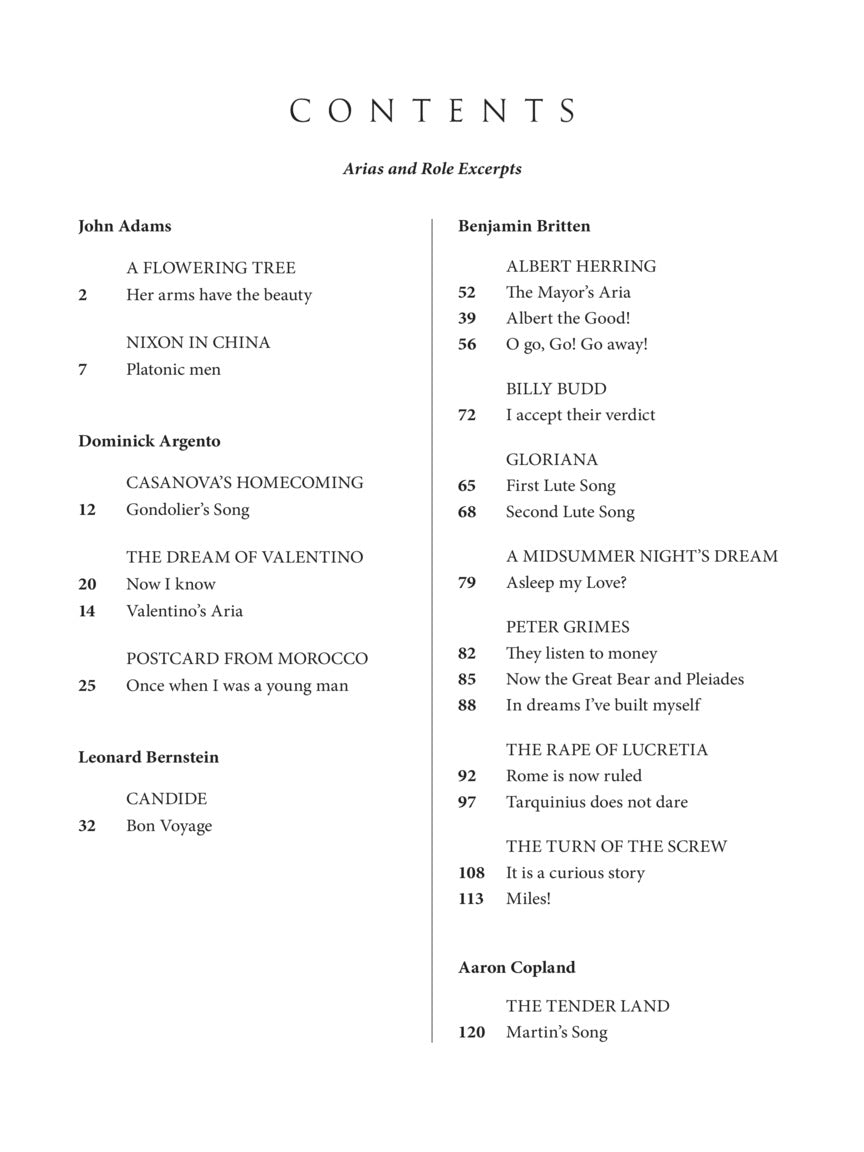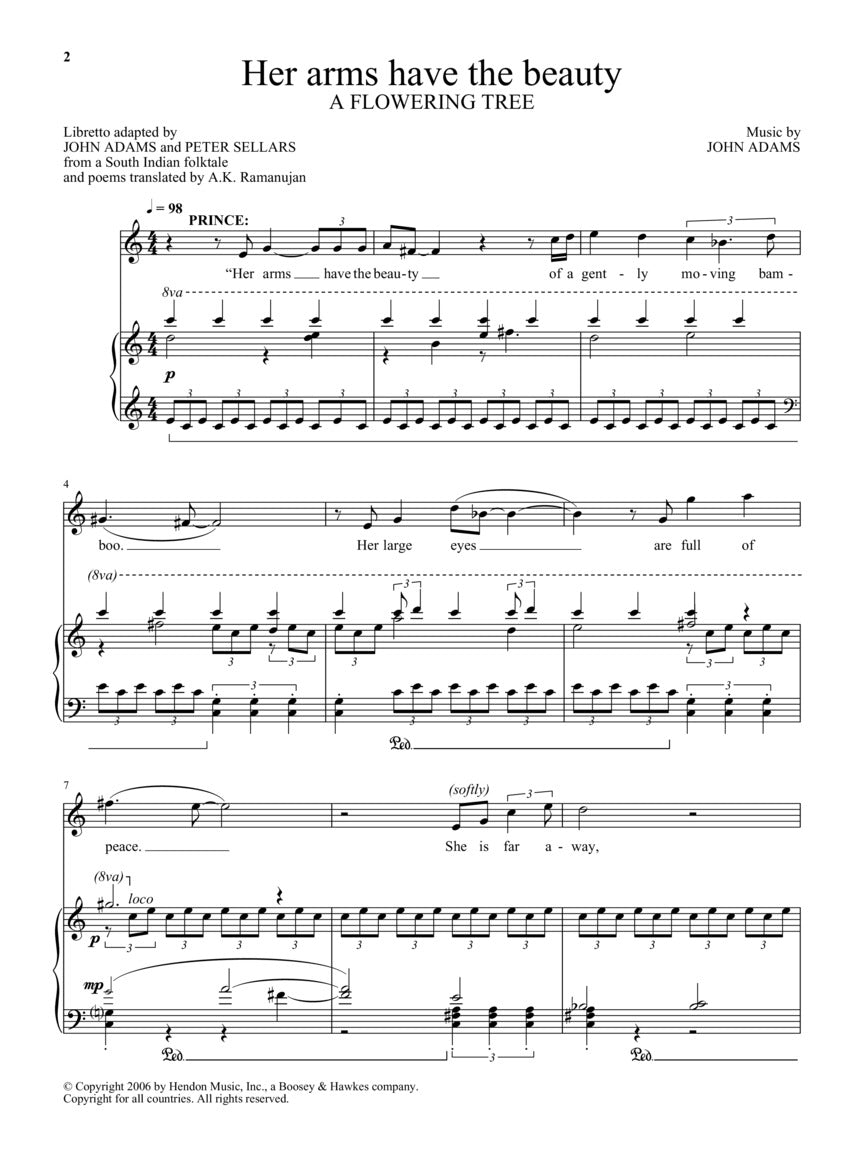Boosey & Hawkes Opera Anthology – Tenor
In stock and typically ships within 1 business day.
- Composers: Benjamin Britten (1913-1976), Aaron Copland (1900-1990), Richard Strauss (1864-1949), Sergei Prokofiev (1891-1953), Carlisle Floyd (1926-2021), Mark-Anthony Turnage (1960-), Sergei Rachmaninoff (1873-1943), Dominick Argento (1927-2019), Igor Stravinsky (1882-1971), Leonard Bernstein (1918-1990), John Adams (1947-), Ned Rorem (1923-2022)
- Editor: Richard Walters
- Instrumentation (this edition): Piano Reduction, Tenor
- Originally for: Opera
- Work Language: English
- ISMN:
- Size: 9.0 x 12.0 inches
- Pages: 226
Description
This landmark publication collects arias and role excerpts from operas by John Adams, Benjamin Britten, Carlisle Floyd, Richard Strauss, and many other composers published by Boosey & Hawkes. Includes extensive plot notes and translations.
Works:
- Her arms have the beauty from J. Adams: A Flowering Tree
- Platonic men from J. Adams: Nixon in China
- Gondolier's Song from Argento: Casanova's Homecoming
- Now I know from Argento: The Dream of Valentino
- Valentino's Aria from Argento: The Dream of Valentino
- Once when I was a young man from Argento: Postcard from Morocco
- Bon Voyage from Bernstein: Candide (1989)
- The Mayor's Aria from Britten: Albert Herring, Op. 39
- Albert the Good! from Britten: Albert Herring, Op. 39
- O go, Go! Go away! from Britten: Albert Herring, Op. 39
- I accept their verdict from Britten: Bill Budd, Op. 50
- Gloriana: First Lute Song from Britten: Bill Budd, Op. 50
- Second Lute Song from Britten: Bill Budd, Op. 50
- A Midsummer Night's Dream: Asleep my Love? from Britten: Bill Budd, Op. 50
- Peter Grimes: They listen to money from Britten: Bill Budd, Op. 50
- Now the Great Bear and Pleiades from Britten: Bill Budd, Op. 50
- In dreams I've built myself from Britten: Bill Budd, Op. 50
- Rome is now ruled from Britten: The Rape of Lucretia, Op. 37
- Tarquinius does not dare from Britten: The Rape of Lucretia, Op. 37
- It is a curious story from Britten: The Turn of the Screw, Op. 54
- Miles! from Britten: The Turn of the Screw, Op. 54
- Martin's Song from Copland: The Tender Land (1954)
- So there you were from Floyd: Cold Sassy Tree
- Sometimes th' pain of missin' him from Floyd: Cold Sassy Tree
- Lennie's Aria (Oh, I feel cold inside) from Floyd: Of Mice and Men
- Then marry me, Cathy from Floyd: Wuthering Heights
- O cruel, cruel case! from Britten: Beggar's Opera, Op. 43
- Il est drôle, le Prince! from Prokofiev: The Love for Three Oranges, Op. 33
- Young Gypsy's Romance from Rachmaninoff: Aleko (Алеко) (1892)
- The Stage Manager's Aria (We're all coming up here from Rorem: Our Town (2005)
- Ich hab's geschworen from Strauss: Arabella, TrV 263, Op. 79
- Im Gegenteil from Strauss: Ariadne auf Naxos, TrV 228, Op. 60
- Das Sonett (Kein Andres, das mir so im Herzen loht from Strauss: Capriccio, TrV 279, Op. 85
- Di rigori armato il seno from Strauss: Der Rosenkavalier, TrV 227, Op. 59
- Hussar's Aria from Stravinsky: Mavra (1922)
- Here I stand from Stravinsky: The Rake's Progress (1951)
- Love, too frequently betrayed from Stravinsky: The Rake's Progress (1951)
- Vary the song from Stravinsky: The Rake's Progress (1951)
- Sellem's Auction Scene from Stravinsky: The Rake's Progress (1951)
- I have waited from Stravinsky: The Rake's Progress (1951)
- Turnage: Valium, prozac from Anna Nicole
Publishers use a lot of words to describe what they sell, and we know it can be confusing. We've tried to be as clear as possible to make sure you get exactly what you are looking for. Below are descriptions of the terms that we use to describe the various formats that music often comes in.
Choral Score
A score for vocalists that only contains the vocal lines. The instrumental parts are not there for reference. Generally, cheaper than a vocal score and requires multiple copies for purchase.
Facsimile
Reproductions of the original hand-written scores from the composer.
Full Score
For ensemble music, this indicates that the edition contains all parts on a single system (there are not separate parts for each player). In larger ensembles, this is for the conductor.
Hardcover
Hardbound. Generally either linen-covered or half-leather.
Orchestral Parts
Similar to a wind set, this is a collection of parts. In the case of strings, the numbers listed are the number of copies included, though generally these are available individually (often with minimum quantities required).
Paperback
When publishers offer multiple bindings (e.g. hardcover) or study scores, this is the "standard" version. If you're planning to play the music, this is probably what you want.
Performance / Playing Score
A score of the music containing all parts on one system, intended for players to share. There are not separate parts for each player.
Set of Parts
For ensemble music, this indicates that there are separate individual parts for each player.
Solo Part with Piano Reduction
For solo pieces with orchestra, this is a version that contains a piano reduction of the orchestra parts. For piano pieces, two copies are typically needed for performance.
Study Score
A small (think choral size) copy of the complete score meant for studying, and not playing. They make great add-ons when learning concertos and small chamber works.
Vocal Score
A score prepared for vocalists that includes the piano/organ part or a reduction of the instrumental parts.
Wind Set
For orchestral music, this is a collection of wind and percussion parts. The specific quantities of each instrument are notated.
With Audio
In addition to the printed music, the edition contains recordings of the pieces. This may be an included CD, or access to files on the internet.
With / Without Fingering (Markings)
Some publishers prepare two copies - a pure Urtext edition that includes no fingering (or bowing) suggestions and a lightly edited version that includes a minimal number of editorial markings.









